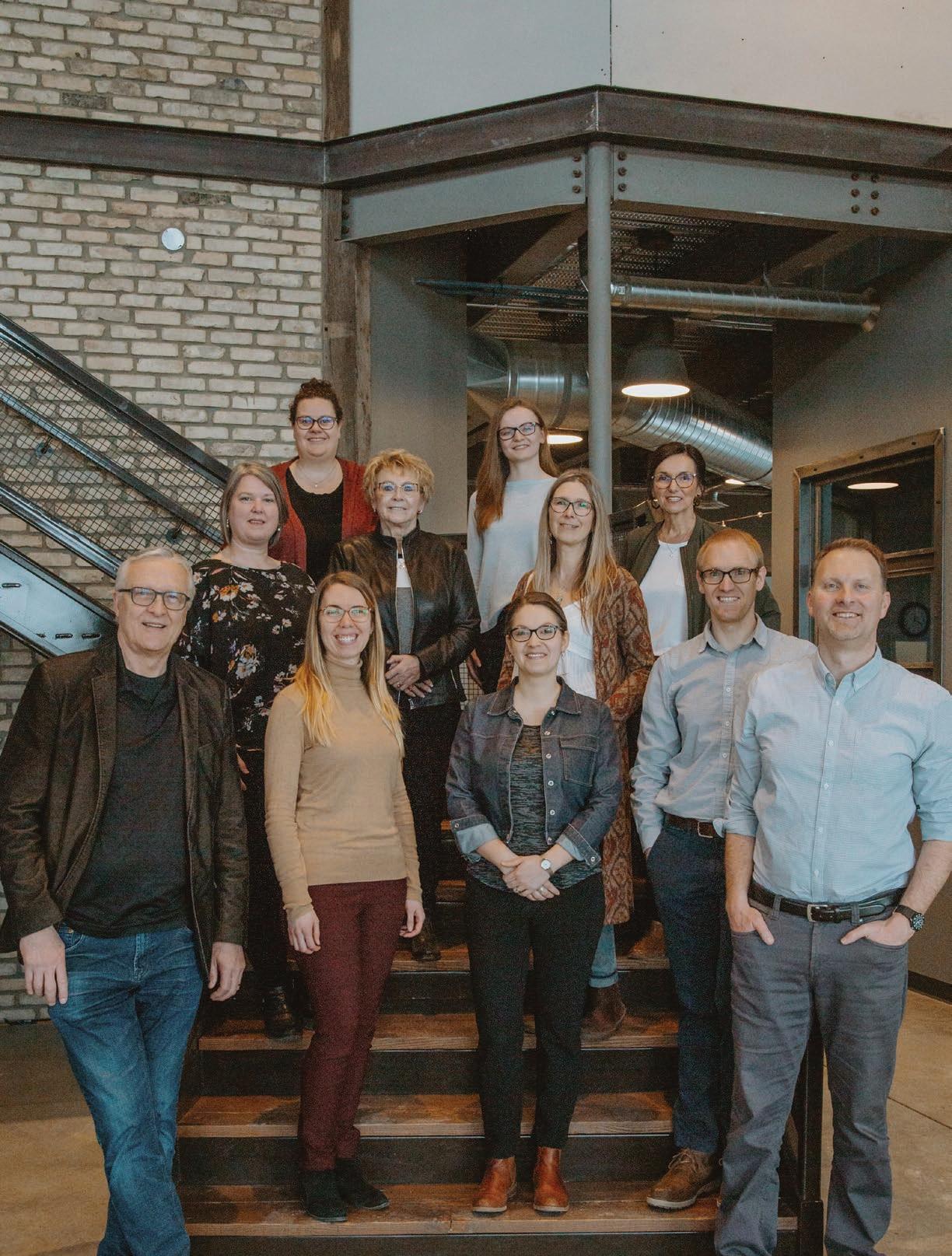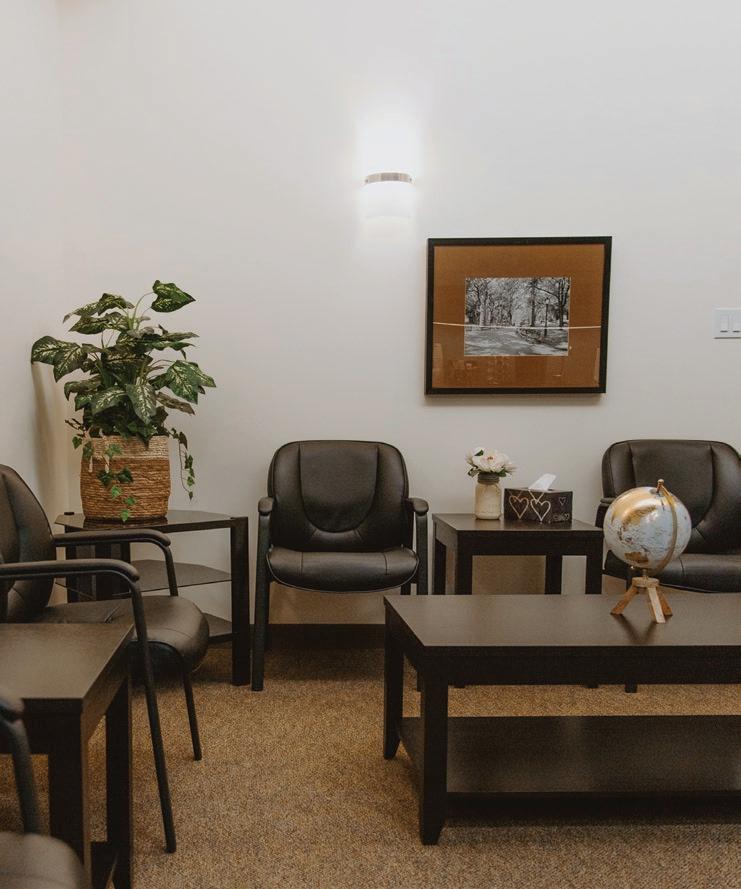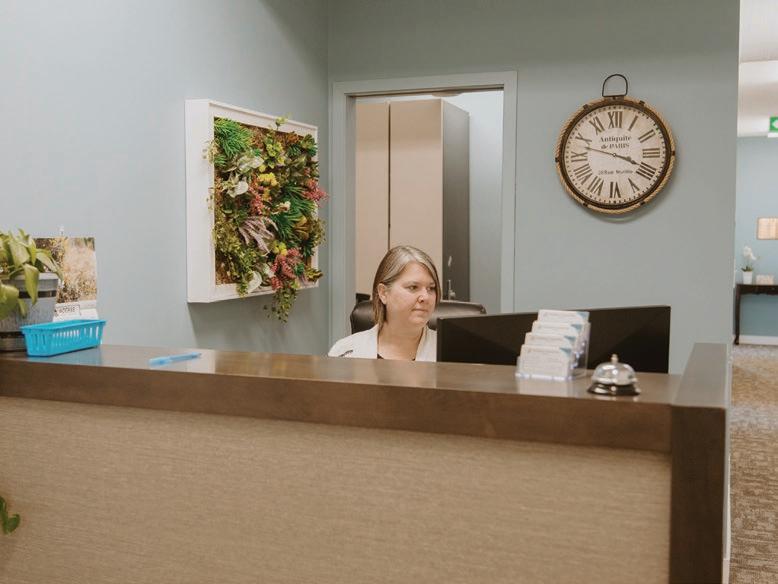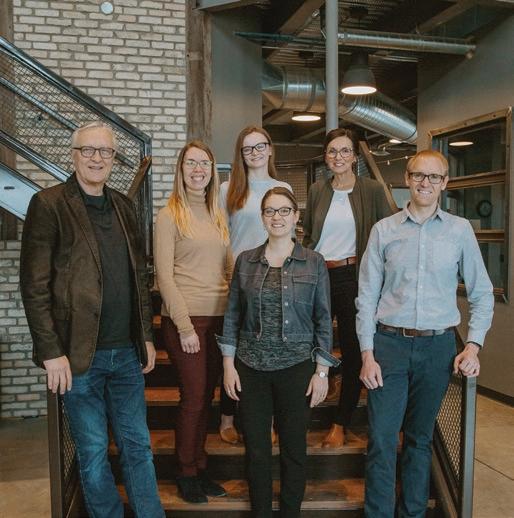
11 minute read
PEMBINA COUNSELLING CENTRE | Life is a Journey
PEMBINA COUNSELLING CENTRE
“Often, we just get stuck, and we need someone to help us move forward again,” says Paul Penner. After over 25 years as a counsellor at Pembina Counselling Centre (PCC), he’s seen the profound and lasting effect that professional help can have.
“When there’s anxiety or depression, or relationship issues, people usually try to help themselves. But it can become overwhelming; they’re looking for hope. And that’s where we come in.”
PCC exists to help individuals who are struggling personally or in relationships, to gain direction and find lasting hope.
The not-for-profit organization began in 1993, with a vision to provide affordable, valuesbased counselling for individuals across the Pembina Valley. They wanted to provide support that wasn’t funded by the government, so they could stay true to their Christian values and hold themselves accountable. The community supported this vision and definitely saw the need for this kind of service.
Paul joined the PCC team in 1997. Along with a Master’s degree in counselling, he brought to the table 11 years of experience at a community outpatient centre in Ontario.
“Judy Heide and I were the counselling staff then, working out of a small office at the Buhler Active Living Centre,” he recalls. “PCC was only four years old at the time and had been run by a steering committee. The newly formed board wanted an executive director as well as a counsellor, so that’s kind of where I came in.”
With 343 kept appointments that first year, the need for more space and staff soon became evident. The following year, they moved to an



area further down the hall, which offered larger offices and a more separated reception area and waiting room. “And with that space, we added more counsellors, too. Things were evolving. We were growing,” Paul says.
The areas of practice began to expand, as well. “Initially, it was much more general counselling, and specialties weren’t really established. But we were reaching more and more people with problems they didn’t know how to resolve. They sought us out. We were building credibility in the community. We wanted them to get to know us and wanted feedback, too, to know if it was a good experience for them. It’s been a gradual growth ever since.”
In 2018, the centre moved to its current location, in the former Morden Hospital building on Stephen St. “We had five staff members at the time, and because we were sharing three offices at the Buhler facility, we couldn’t book as many appointments as we wanted to. It was limiting us, and it was time to expand. We had adequate funding to finish what we started, this was a great fit for us, and the community was totally on board with the move.”
With four counselling offices, the new space is quite adequate. Paul says they have paid special attention to how the new space is decorated and furnished.
“We want people to feel peace and serenity when they come here. We chose warm colours and artwork depicting peaceful settings. We want to avoid a clinical feel. We have big, comfortable armchairs, and we’ve even been deliberate about the background music. It all adds to the ambience - a peaceful and private, relaxing, welcoming environment where they can feel safe and at home. I truly believe our clients sense joy when they come here. There’s no intensity. There’s ease. This is their space.”
In 2019, PCC moved their Winkler branch into a new space with two more offices. And more recently, they opened another office in Altona.
“It’s been a desire for us for a while to have an office in Altona. After all, we are the Pembina Counselling Centre, so we want to serve the whole Pembina Valley at large. We were already getting many clients from Altona, so we wanted to serve them in Altona,” says PCC Executive Director Chris Derksen.
“We’re hoping to expand our space and presence there, and we’re looking to get a female counsellor going to Altona, as well.”
Today, PCC employs 13 staff members: six counsellors, three administrators, two part-time receptionists, a bookkeeper, along with an executive director. The centre supports clients from communities across the Pembina Valley and the South Central region, including people from Winnipeg, Morris, Portage la Prairie and Killarney.
Their team of experienced, Master’s-level counsellors support their clients through a number of areas of practice, including marriage counselling (joint and individual), anxiety, depression, anger management, post-traumatic stress disorder (PTSD), abuse, stress, parenting, counselling for teens and children, cognitive behavioral therapy (CBT), phobia, and attachment disorders.
“We have two male counsellors and four female counsellors, whose services cover everything from anxiety and depression issues to relationship struggles or parenting concerns. We want people to feel comfortable with whoever they identify to join them on their journey. So, we ask people if they have a preference. We encourage them to go to our website and read their bios and find the one that is right for them,” Paul says.
Paul is a relationship counsellor and also dedicates one day a week to people dealing with post-traumatic stress disorder. “I have specialty training in that area. I want people to know there really is help and life can be normal again. I’ve worked with a lot of people. It’s a good thing to get help. Sometimes people feel stuck because it can replay for years. And then I would say come and see me.”
Chris took on the executive director role in December 2019.
Along with university and college training in marketing and business, he has years of experience in paraministry, from managing summer camps at Calvary Temple, to nearly 10 years of walking alongside those struggling with addictions at Adult and Teen Challenge.
“It was providential. I had just finished with Adult and Teen Challenge in August 2019 and was considering counselling. I called Paul. He told me he was stepping down from the executive director position. He told me about the job and said the word ‘fundraising’. I said, ‘I can help with that!’ So I applied and here I am.”
Originally from Winnipeg, Chris married Lois who grew up in the Pembina Valley and feels right at home in the community. His first impression of PCC could not have been more positive. “What I saw was a fantastic team, from the counsellors to the administrators. People see the comradery and the joy that we have coming to work. It’s a team, and there’s a level of support here that is rare to find.” Chris is also impressed with the PCC board of directors. “We’re community based. We have a community board. And we have a good board. Our working relationships from the top to the bottom have been very positive and we’re grateful for that. It’s made up of community members and businesses who do all they can to support this organization.”
As a charitable organization, one of their mandates is to make counselling affordable to everyone. “Our model is 50 percent of our income comes through client fees, so those are the people who can pay and people who have insurance and so forth. The rest of the money comes from grants and donations from local businesses, organizations, and individuals. What that allows us to do is charge on a sliding fee scale. So, we have a conversation with the client. If they need assistance, we work together and narrow it down to a price they can afford. We don’t want the cost to be a factor in whether someone gets help or not. Counselling can be expensive. Not everyone is in a situation where they can afford it.” He adds, “We are so grateful for the generosity of the communities across the Pembina Valley. We would not exist without their support. But thanks to them, we’ve been able to expand and grow our ministry to continue to serve, and also serve more.”
The majority of their clients are referrals from other organizations, including corporate, government and other ministries. “They are our friends. We’re not in competition with anyone. It’s all-hands-on-deck. We’re all doing good work here and we love them and bless them. There’s more than enough work to do and we’re just doing what we’re called to do.”
Just months after Chris joined the team, the pandemic hit. Pembina Counselling Centre was deemed an essential service, so their offices remained open. “Counselling is an


intimate service, so by and large, people still wanted to be here. They wanted face to face meetings. So, we sanitized and followed all the protocols. And for those who preferred, we provided phone and video counselling by request,” Chris says.
They also facilitated workshops with small groups so they could voice their concerns and interact with each other in a controlled setting. “We encouraged them to share their stories and gave them homework to do every week. It became quite a hit, and we felt it was very important work. Through the last few years, there have been a wide range of emotions from fear, anger and anxiety, to pain, loneliness and loss. Now I feel our mission is to help heal and reconcile.”
The emotional toll of the pandemic becomes evident when you look at the increasing number of clients. In 2020, there were 2,200 kept appointments. That rose to 3,400 in 2021. And this year, if the numbers stay consistent, they’re on track for close to 4,000.
Addressing a few stigmas, Paul says while they are a values-based counselling service, they would never impose their values or beliefs on their clients.
“We are not here to proselytize. And we don’t want to answer questions that aren’t being asked. We will go wherever people want to go, if it’s significant to them. If it’s personal to them, we’ll go. If it’s a matter of faith, we’ll go there with them, too. We’re not closing the door on anything. We just want to respect the agenda of the people who are asking us to journey with them.”
He adds, “We can ally with anybody that has outcomes they value in life, that don’t hurt them or others. When it’s going to hurt them, we want to challenge them. We ally with what’s good for people. And sometimes they don’t even see that it’s not a good thing. But we hope we can build a relationship where they can ask the questions and see for themselves. Moralizing is using truth to manipulate or pressure people to change. We don’t want to moralize; we want them to see. But you can’t do that if you don’t have a relationship. You have to build that connection with them first.”
He compares it to a dance. “We let them lead and step where they want to go. And we don’t want to be judgmental. To be judgmental is to communicate to people that they’re not worthy of our caring involvement. We don’t want to send that message. We want to send the opposite. That you are worth knowing and understanding.”
He also believes that the language needs to change. “The popular words ‘mental health’ should be replaced with ‘personal wellbeing’ and ‘emotional wellbeing’. They are different words with different inferences and I think they’re better. ‘Mental health’ makes people think there’s something wrong with their thinking capacity. That’s not usually the issue. Emotional wellbeing is the real issue. They’re conflicted within themselves, or they’re in conflict with another person’s values. They value that person, so they want to sort that out. That’s not mental health. That’s relational. Psychiatric disorders on the other hand, where there’s a neuro/biochemical feature to it, that’s different. I think because we call it mental health, it pulls people into that rubric and then we feel like, ‘Oh, that’s not me.’ That’s the stigma.”
He says, sometimes, just having someone to listen is all you need.
“Years ago, before I became a counsellor, I told my grandpa I wanted to hear his story. ‘Could we go to the park, and you tell me about things that were important to you? Things that influenced your faith journey and your life.’ So we did. And we talked for three hours. And later, he said, ‘I never learned so much in all my life!’ and I was the one listening! I think that’s true for people. They discover things that make sense to them because they’re putting feelings together with words. And the context when they’re talking about it - that’s like connecting the dots with lines.
“People should talk about things with people they can trust, and who care about their concerns. A professional is trained to handle more stuff than the average person. Finding people who care, matters. But when you’re stuck, it’s good to see a professional who listens well. And I think you will find that here.”










